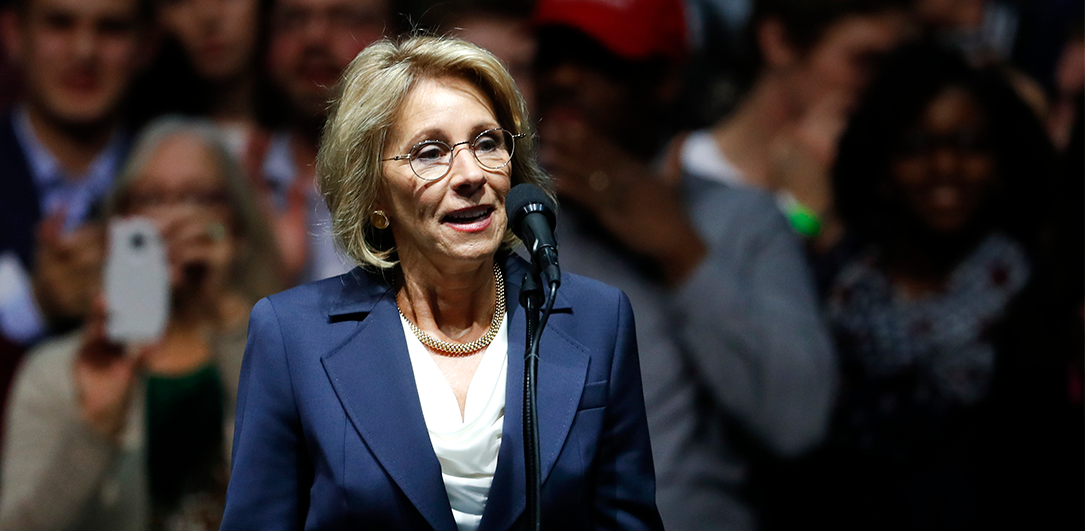By Miranda Jackson
For The Diamondback
The University of Maryland education college’s Graduate Student Organization held a town hall meeting Thursday night aimed at initiating a campus-wide dialogue after Betsy DeVos’ appointment as Education Secretary.
University of Pennsylvania professor Jonathan Zimmerman delivered the keynote presentation to about 40 people in Tawes Hall.
Zimmerman said it isn’t DeVos’ proposed policies that the American public should be concerned about, but rather DeVos herself. The GOP fundraiser and philanthropist didn’t attend public school or send her own children to them — a first for the position.
“One of the biggest problems in the United States is that education doesn’t receive the attention, the money, the status it deserves, and having somebody like DeVos in charge of it simply reinforces that problem,” Zimmerman said.
DeVos has championed the idea of charter schools and school vouchers, something President Trump promoted on his campaign. The administration’s plan would involve a $20 billion federal voucher program for families to send their children to private and religious schools.
DeVos’ confirmation hearings often became heated, as senators pressed her on her controversial views and lack of experience. She was eventually confirmed 51-to-50 after Vice President Mike Pence had to cast a historic tiebreaker. It marked the first time a vice president had to break a tie on a cabinet nomination.
Zimmerman said he is neither completely for nor against the use of vouchers for funding private education.
“The people who criticize the use of vouchers or public money going to private schools…also say kids who go to Georgetown [University] shouldn’t be allowed to access a federal loan,” Zimmerman said. “I think not, and I’d like to know what the difference is.”
Charter schools were another topic of concern brought up at the town hall. Zimmerman said most of the charters that DeVos backed in her home state of Michigan appear to be failures based on the performance level of the students. The state continues to rank poorly in standardized testing.
But Zimmerman argued that this example should not deter the American public from embracing charters.
“The charter landscape itself is hugely diverse, and I think it’s unfair, to say the least, to use the example of … DeVos’s failed charters in Michigan to criticize [all] charters,” Zimmerman said.
Erin Hogan, graduate assistant and secretary-treasurer of the education college’s Graduate Student Organization, said Zimmerman’s views may not be commonly held, but that’s part of why the reason the organization asked him to speak.
“It is important to create a space for these opposing viewpoints to come together and find commonalities,” Hogan said.
Zimmerman said conversations about controversial topics deserve a place within a school setting, particularly after what he described as centuries of suppression of academic free thought.
“[Schools] weren’t designed to engage controversy — they were designed to oppress it,” Zimmerman said. “The safest move really is to keep quiet.”
Teachers should help break the echo chamber of what comes through their students’ news feeds, he said, and provide opposing opinions and facts in the classroom to what students are biasedly channeling.
“Nothing has [changed], and nothing will, until adults of every mind resolve to let our students and teachers make up their own,” Zimmerman said.
The education college’s graduate student organization plans to hold more town halls throughout the semester to discuss the election’s impact on education.
The group’s president Diana Bowen, a doctoral student in the education college, said she wants to see the public educating themselves on a variety of viewpoints when it comes to topics as difficult as DeVos and her place in public education.
“That’s sort of how ideas evolve and improve,” Bowen said, “and if we don’t hear all of the sides of the argument, from an academic standpoint we may not be making the best decision in how we progress in policies.”



